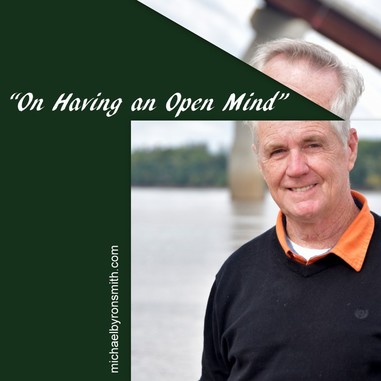
An Eye-Opening Conversation
I had a conversation with a dear friend the other day and I asked her thoughts about something for which we disagreed. She explained her views and not understanding them, I asked more questions. Not surprisingly, neither of us changed our stance. But we did know more about each other and our philosophies.
The following week that conversation came up. I told her the only reason I had pressed her was because I truly wanted to understand her stance. Being honest, my friend said, “No you didn’t, you just wanted to harass me (or something similar) because you didn’t agree with me”. I was a bit stunned! In no way did I want her to feel bullied or threatened. I debate to understand, not to denigrate or belittle anyone. As it turns out, it takes a special skill I may be lacking to make that apparent.
Thoughts on Open and Closed Minds
One large group of Americans think they have open minds regarding all sorts of ideas and lifestyles. Yet, when someone questions these ideas or lifestyles, their minds are not open to those questions. Another group of Americans cautiously resist being open minded to ‘change’, especially when it threatens their traditions or beliefs. Both groups can be very stubborn.
Sometimes, the rebellious among us think they are being open minded by refuting their parents, bosses, or government. Thinking they are open-minded because their vision looks beyond the established ways things have been done. What they are rebelling against may or may not be proven to be unfair or wrong. They often think of themselves as being altruistic and cutting edge. Sometimes, they are. Those who are being rebelled against have little regard for the reasons for the rebellion for it can be difficult to be sympathetic to anyone bashing your world.
Fear is a strong reason for a closed mind. We fear the result of being wrong, of being exposed. The realization that you are wrong, if you are, is painful and admitting it is more so. Also, many of us have a fear of conflict so discussion is avoided and minds remain closed for lack of information.
A ‘closed’ mind could also be described as a suspicious or doubtful mind. To change a suspicious or doubtful mind takes much more work, but it can be done. Brainwashing is a negative sounding term that occurs for both good and bad. It breaks down a conviction or habit and reorganizes a belief system to bring out a different result. Mantras are a tool used to train our minds. For instance, the character Stuart Smalley of Saturday Night Live would repeat over and over, "I'm good enough, I'm smart enough, and doggone it, people like me." He said this in hopes people would like him, assuming they did not.
I, myself, once had a confidence issue. I brainwashed (trained) myself out of it through the constant study of books that indoctrinated me to a new attitude. Students go to college coming out more liberal or more conservative depending what college they attended. Commercials brainwash us every day to make us think we need their product. Sometimes your mind is more open than you think. And often more closed than you will admit.
What Children Cartoons Can Teach Us
In the children’s series “Little Bear”, Duck may be the most open-minded of all the characters. She can be convinced of anything. She is also not very smart--in the most charming of ways. A duck with an open mind to everything has no standards or philosophy on life. Owl, another character, is not so open minded. He hesitates before going along with anything believing he has a better way. Owls are thought to be wise, but Owl wants to be the smartest animal in the forest. Having a closed mind is not good, but it feels safe. An open mind sounds good, but it may lead you down the wrong path if you are not careful.
What Really Suggests an Open Mind?
In my opinion, those that are closest to having an open mind are those that ask questions about things they don’t understand. People like this are willing and ready to learn, but also cautious. Little kids may not be cautious, but they are very open-minded. They ask questions about everything because they want to learn. As they grow older, their minds close ever so slowly as they make up their own minds about things and ask fewer and fewer questions. For a parent to say, “Because I told you so!” to their child’s question is not the kind of response that will keep a mind open and curious. Patience for inquisitive children is a blessing. We never want to take that quality away from them.
Summary
When someone asks you to have an open mind, try to do so but be suspicious of their motives. Are they trying to change you, belittle you, or understand you? Are they telling you what they think and not asking you what you think? Do they listen? If you ask questions of them, you are expressing an open mind and/or protecting yourself against subtle brainwashing, but you must really listen and consider their point of view! If someone with an opposite view doesn’t ask questions about you and your views, then they do not care what you think and don’t have an open mind themselves. In short, to be open-minded consists of asking, listening, considering, deciding, and verifying.
Important Note for Dads: In the vein of being open-minded, I plea for fathers to be the example. There is no better way than for dads to be open-minded as to their fathering skills than by asking questions of themselves. Please test yourselves using "A Dad's Self-Inspection Checklist", which can find here, or in Appendix B of "The Power of Dadhood".
<http://michaelbyronsmith.com/blog-helping-fathers-to-be-dads/the-2nd-annual-dads-self-inspection-checklist>





